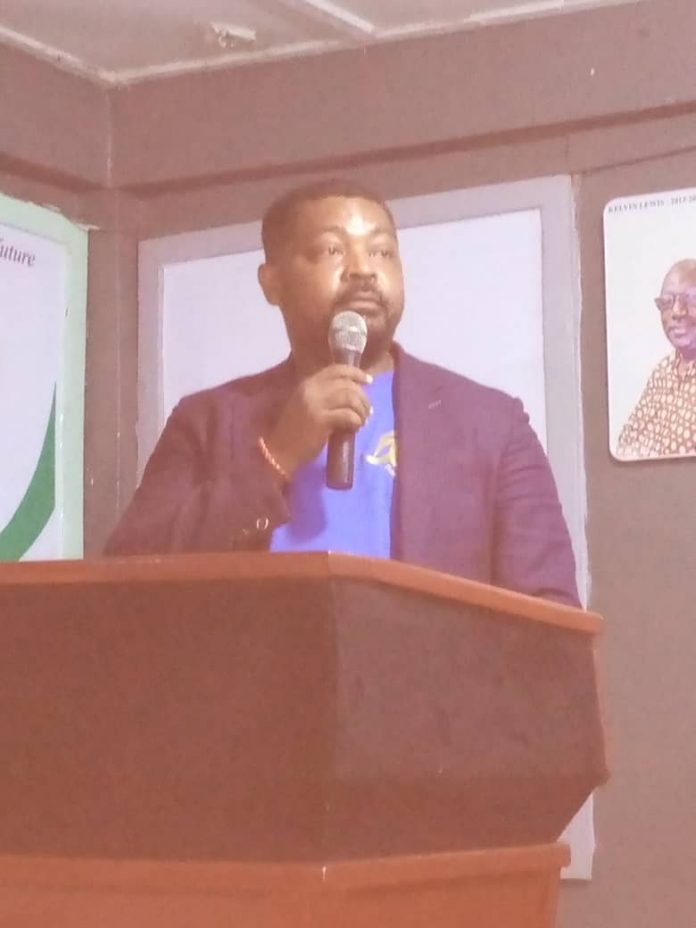By Amin Kef Sesay
In observing World Press Freedom Day on Monday 3rd May, 2021, the President of the Sierra Leone Association of Journalists (SLAJ), Ahmed Sahid Nasralla, urged and appealed to the elected representatives of the people in the Parliament of Sierra Leone to scrutinize the cybercrime bill and take onboard their concerns (and those from expert groups) in the same spirit and manner they collectively pursued and achieved the repeal of Part V of the Public Order Act of 1965, and the passing of the IMC Act 2020.
He said that “30 years ago, a group of journalists, including our own Paul Kamara from Sierra Leone, met in Namibia to adopt the Windhoek Declaration for the development of a free, independent and pluralistic press,” adding that SLAJ therefore joined the rest of the world and UNESCO to celebrate 30yrs of the Windhoek Declaration, as it gives them an opportunity to reflect where they have come from, where they are now and where they want to go with regards freedom of speech and of the press, and it further reminds them of their responsibilities as journalists, and the obligations of Governments to guarantee these fundamental rights that are crucial to the development of the country’s democracy.
He maintained that for Sierra Leone, and SLAJ specifically, for the first time in 50 years they are commemorating World Press Freedom Day without having to call on the Government to scrap the infamous Criminal and Seditious Libel Law contained in Part V of the Public Order Act of 1965.
He noted that Freedom of expression is the fundamental human right upon which all other freedoms (association, assembly and peaceful protest) depend, and so they want to thank His Excellency the President of Sierra Leone Julius Maada Bio, his Government and the Parliament of Sierra Leone for this brave accomplishment.
He said to start the celebration of this landmark victory, SLAJ is opening a Book of Reflection on the demise of the Criminal and Seditious Libel Law, where victims will share their experiences with the anti-free speech legislation, stating that later on in the course of the year, SLAJ will premiere a documentary showing the long walk to freedom; and they are also working to install a commemorative structure to Free Speech and Free Media.
“Let me reiterate what I said following the repeal of the criminal libel law that whilst we have been given more freedom to do our work, we must know that such freedom goes with immense responsibility. So we must not give any reason to those who were opposed to the repeal to say we told you not to repeal. This is not to say, however, that as journalists, we must not investigate and expose corruption in high places; or we must not hold public officials and our government to account. What we are saying is for us to do all of this, but in a responsible manner and strictly following the codes that define our profession” he maintained.
On the Cybercrime Bill, Nasralla said SLAJ has made its position clear on the Cybercrime Bill 2020 that it is not against a legislation that seeks to protect and promote responsible use of the cyber space, which is becoming increasingly a dangerous threat to our individual and collective security, peace and stability, but that in its current draft form, it is not a good law for our country.
He pointed out that in their position statement, which is on behalf of the entire media fraternity in the country, including the IMC, RAIC and MRCG, and which they have submitted to the Ministry of Information and Communications and the leadership of Parliament, they raised serious concerns relating to provisions and sections in the bill that have the potential to undermine the gains we have made as a country in the area of freedom of expression and of the press, and people’s privacy rights.
On the Safety and security of journalists he said a recent study on the State of Safety of Journalists Policies and Practices Among Media Houses in the country conducted by the MFWA and MRCG, with support from the Dutch Foreign Ministry (through the Embassy of the Kingdom of the Netherlands in Ghana) show that majority of the media houses studied lacked safety and security, and gender policies, furthering that Journalists in the line of duty expose themselves to dangers when covering riots or demonstrations, and most popular perpetrators of violations against journalists are police officers, military personnel, politicians, civil servants, and community stakeholders/people.
So while the criminal libel law is gone, harassment and intimidation of journalists are now taking different forms.
He stated that “SLAJ is concerned about this and we will discuss these issues, including the recommendations of the study, at our coming AGM to brainstorm on workable approaches to ensure the safety and security of all journalists, and to promote gender mainstreaming in the media.
“We want to look at the future role of the media and verified information. In 10 years’ time, the role of the media in providing accurate information, exposing corruption, holding public officials and governments to account, educating and raising awareness, etc. will not change much. What will change is the demand for greater responsibility of the media in combating fake news, hate speech, misinformation, disinformation, and conspiracy theories, all of which have culminated into a raging media virus called infodemic” he maintained.
He concluded by urging the Government and politicians to make a bold commitment to never again pass any law that will criminalize free speech, and urged every journalist to aspire to be a true and patriotic professional.




